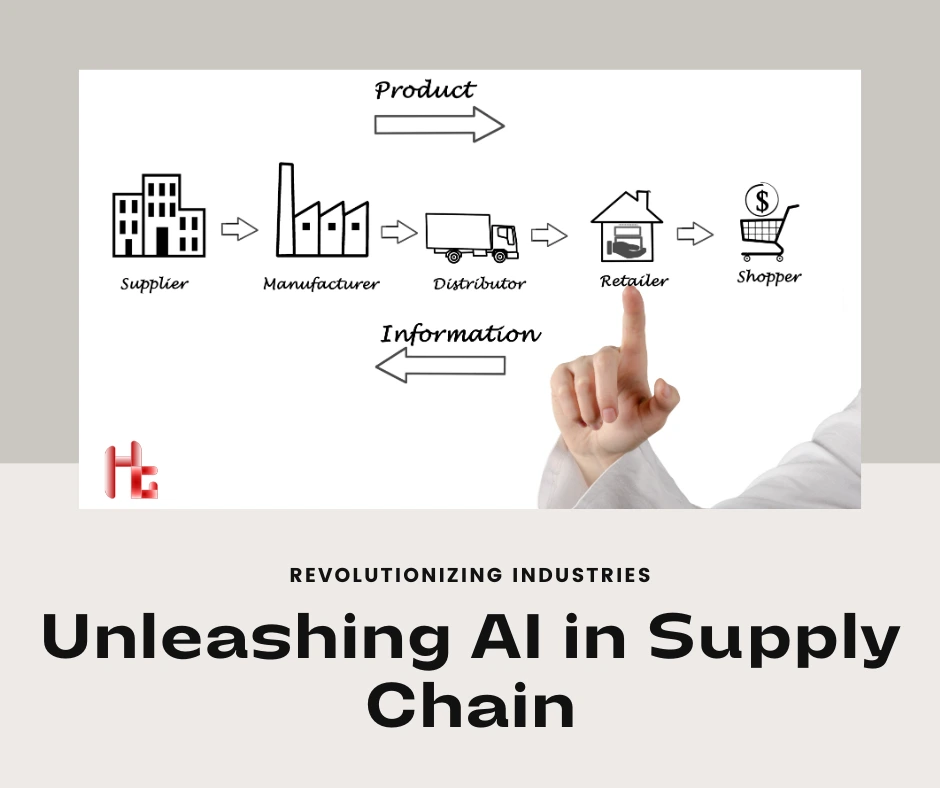AI Enhancing Supply Chain Management Today
Supply chain management (SCM) has always been a critical pillar for businesses globally, ensuring that goods and services move seamlessly from producers to consumers. However, in today’s fast-paced, data-driven economy, traditional supply chain practices are becoming increasingly ineffective. As the complexities of modern logistics grow, many companies are turning to AI Enhancing Supply Chain Management to navigate these challenges. AI isn’t just a trend in supply chain management—it’s fundamentally transforming the way products are manufactured, transported, and delivered across the globe..
The adoption of AI is revolutionizing every aspect of supply chain operations, from optimizing logistics and reducing inefficiencies to predicting potential disruptions and improving inventory management. In a world where supply chains are more interconnected than ever before and demand for real-time data continues to rise, AI offers a significant competitive advantage. With tools like machine learning, predictive analytics, and advanced AI technologies, businesses can streamline processes, improve decision-making, and anticipate problems before they impact the flow of goods.
This transformation goes beyond automating routine tasks; AI helps companies become more proactive in addressing the uncertainties and risks that arise within supply chains. By leveraging AI, organizations are better equipped to forecast demand, manage inventory more effectively, and prepare for disruptions, allowing them to act swiftly and mitigate risks before they escalate. In this blog, we will explore how AI is enhancing supply chain management today, with a particular focus on optimizing logistics, predicting and preventing supply chain disruptions, and advancing inventory management through predictive analytics.
The Growing Importance of AI in Supply Chain Management
In the world of supply chain management, the stakes are high. From managing raw materials to ensuring timely delivery, businesses face numerous challenges that can cause costly disruptions. Traditional supply chain systems often rely on manual oversight, which is slow, prone to human error, and incapable of processing vast amounts of data in real-time.
AI, however, can handle complex tasks more efficiently and accurately. By processing real-time data through machine learning algorithms, AI helps businesses make faster and better-informed decisions. The result? More reliable deliveries, fewer errors, lower costs, and the ability to predict and respond to changes in the market or disruptions in the supply chain before they happen.
AI’s role in supply chain management has never been more critical. With increasing demand for transparency, sustainability, and efficiency, logistics AI is paving the way for smarter, faster, and more agile supply chains. The impact of AI technologies in logistics is particularly profound, as it helps organizations optimize routes, improve fleet management, and predict delays caused by weather or traffic patterns.
AI Optimizing Logistics in Supply Chain Management
One of the most visible impacts of AI is in logistics optimization. Logistics has always been a key area where delays, inefficiencies, and errors can have significant financial repercussions. AI technologies help organizations streamline the transportation of goods by optimizing everything from routing decisions to fleet management.
- Route Optimization: AI in supply chain logistics uses real-time data from traffic reports, weather patterns, and road conditions to optimize delivery routes. AI-powered systems can calculate the fastest and most efficient routes, helping companies save time, reduce fuel consumption, and cut costs.
- Predictive Maintenance: Logistics AI can predict when equipment (such as trucks, warehouse machines, or conveyor belts) is likely to fail, allowing businesses to perform maintenance before breakdowns occur. This predictive capability minimizes downtime, improves asset utilization, and extends the life of costly equipment.
- Smart Warehouse Management: AI improves warehouse management by streamlining product storage and retrieval. By predicting demand patterns and adjusting storage accordingly, AI can reduce inefficiencies, speed up the picking process, and optimize space usage.
- Last-Mile Delivery: The final step in logistics—last-mile delivery—can be particularly challenging. AI-powered tools are increasingly being used to optimize last-mile delivery routes, predict customer demand, and automate delivery systems such as drones and autonomous vehicles.
Predicting and Preventing Supply Chain Disruptions with AI
Supply chains are vulnerable to a variety of disruptions, from natural disasters and labor strikes to political upheaval and unexpected demand spikes. Traditional supply chains often react to these disruptions in real time, which can lead to delays, higher costs, and inefficiencies. In contrast, AI in supply chain management allows companies to anticipate disruptions before they happen.
- Risk Detection: AI systems are capable of scanning vast amounts of data from various sources—including weather forecasts, geopolitical updates, and social media feeds—to detect potential risks. Machine learning algorithms analyze historical data to predict disruptions caused by weather patterns, natural disasters, or even political unrest, giving businesses the chance to proactively adjust their operations.
- Real-Time Risk Management: AI-powered systems continuously monitor supply chain activities, automatically adjusting routes or inventory levels to address disruptions as they unfold. This helps businesses maintain operational continuity, even in the face of unpredictable events.
- Scenario Planning: Using predictive analytics, businesses can model various supply chain disruption scenarios and test different strategies for mitigating risks. AI allows companies to simulate the impact of supply chain disruptions, helping them prepare for the worst and react swiftly to changing conditions.
- Supply Chain Resilience: By identifying vulnerabilities and optimizing risk management strategies, AI enhances overall supply chain resilience. This capability helps businesses avoid costly interruptions and safeguard critical supply chain operations.
Improving Inventory Management with Predictive Analytics
Effective inventory management is essential for maintaining balance within a supply chain. Too much inventory leads to higher storage costs and waste, while too little inventory results in stockouts, lost sales, and unhappy customers. AI-powered predictive analytics helps businesses maintain the optimal inventory levels, ensuring they meet customer demand while minimizing overstock.
- Demand Forecasting: AI can analyze vast amounts of historical data, including sales trends, customer behavior, and market conditions, to predict future demand. This predictive capability allows businesses to forecast which products will be in high demand, ensuring that the right amount of inventory is on hand when needed.
- Automated Replenishment: AI systems can automatically trigger reordering of stock based on demand forecasts and inventory levels, reducing the likelihood of stockouts and overstocking. This automated replenishment system is particularly useful for businesses with large inventories and complex supply chains.
- Multi-Echelon Inventory Management: In multi-echelon supply chains, AI can optimize inventory at various levels—such as at suppliers, distribution centers, and retail locations—ensuring that each level has just enough stock to meet demand without unnecessary surplus.
- Stockout and Overstock Prevention: AI can track inventory in real-time, adjusting stock levels based on predictive demand analytics. By forecasting demand fluctuations accurately, AI helps reduce both stockouts (which lead to lost sales) and overstock (which ties up capital and storage space).
Statistical Analytics: Measuring the Impact of AI on Supply Chains
As AI becomes more integrated into supply chain management, it’s essential to quantify its impact. Statistical analytics play a key role in measuring AI’s effectiveness in streamlining operations and boosting performance.
- Cost Reduction: Research shows that businesses using AI in supply chain management experience significant cost reductions. For example, companies have seen up to 30% reductions in transportation costs and 20% improvements in inventory efficiency. These savings stem from AI’s ability to optimize routing, predict demand, and automate various logistics tasks.
- Time Savings and Improved Lead Times: AI-enhanced forecasting and logistics optimization have led to faster decision-making and shorter lead times. Companies that employ AI in their supply chains report an average 15-25% reduction in lead time. This translates into faster delivery and improved customer satisfaction.
- Improved Accuracy: Machine learning algorithms help businesses make more accurate forecasts, improving demand prediction accuracy by up to 40%. This reduction in forecasting errors helps businesses maintain the right balance of inventory and avoid costly mistakes.
- Operational Efficiency: AI’s ability to streamline processes and reduce human error has resulted in improved operational efficiency. Studies show that organizations using AI-powered supply chain systems have reduced their operational costs by 20-30% while improving service levels and customer satisfaction.
FAQ: AI in Supply Chain Management
What are the main AI technologies used in supply chain management?
AI technologies in supply chain management are diverse and can vary depending on the specific needs of the business. The main AI technologies used include:
- Machine Learning (ML): For predictive analytics, demand forecasting, and route optimization.
- Natural Language Processing (NLP): Used to analyze unstructured data such as customer reviews, social media, and emails to predict trends or customer sentiment.
- Robotics Process Automation (RPA): Automates repetitive tasks like data entry and invoice processing.
- Computer Vision: Used in warehouses for inventory management, quality control, and product tracking.
- Internet of Things (IoT): Used for real-time data collection from sensors on products, vehicles, and equipment.
How does AI improve decision-making in supply chain management?
AI improves decision-making in supply chain management by providing data-driven insights and automating complex processes. Machine learning algorithms can analyze vast amounts of historical and real-time data to identify patterns, trends, and correlations that humans may overlook. This enables supply chain managers to make faster, more informed decisions about demand forecasting, inventory levels, production planning, and risk mitigation, ultimately leading to more efficient operations and reduced costs.
How can AI help in managing supply chain disruptions?
AI helps companies predict and manage supply chain disruptions by:
- Analyzing historical data and real-time information (such as weather, political unrest, or supply delays) to predict disruptions before they occur.
- Risk modeling: AI models various disruption scenarios and tests responses to help businesses prepare in advance.
- Real-time alerts: When a disruption is detected (e.g., a shipment delay or a factory shutdown), AI systems can alert managers and suggest alternatives such as re-routing shipments or adjusting production schedules.
- Scenario planning: By simulating different disruptions, AI enables businesses to understand potential impacts and develop more resilient supply chain strategies.
What role does AI play in improving last-mile delivery?
AI plays a crucial role in last-mile delivery by:
- Optimizing delivery routes: AI uses real-time data like traffic patterns, weather, and road conditions to find the fastest and most efficient delivery routes.
- Predicting delivery times: AI algorithms can predict more accurate delivery windows, improving customer satisfaction.
- Autonomous delivery: AI is enabling autonomous delivery methods such as drones and self-driving vehicles, which can reduce delivery times and costs, particularly in urban areas.
- Dynamic routing: AI can dynamically adjust routes in response to real-time changes, such as unexpected traffic jams or accidents.
Can AI completely replace human decision-makers in supply chain management?
While AI can automate many tasks and provide decision-support tools, it is unlikely to completely replace human decision-makers. AI is best used as a tool to augment human judgment, not replace it. Supply chain managers still need to oversee operations, interpret AI-generated insights, and make decisions based on factors that AI might not fully account for, such as customer relationships or broader business strategy. The synergy between human expertise and AI capabilities is where the true value lies.
What challenges do companies face when implementing AI in supply chains?
Implementing AI in supply chain management comes with several challenges:
- Data quality: AI systems require high-quality, accurate, and consistent data. Poor or fragmented data can lead to inaccurate predictions and suboptimal decisions.
- Integration with existing systems: AI must be integrated with legacy systems (such as ERP or warehouse management systems), which can be technically challenging and time-consuming.
- Talent and expertise: Many organizations lack the necessary expertise in AI, machine learning, or data analytics, which can hinder successful implementation.
- Cost of implementation: AI solutions can require a significant upfront investment in technology, training, and infrastructure.
- Change management: Employees may resist AI adoption due to fears of job loss or lack of understanding of how AI will affect their roles. Proper training and communication are essential for successful implementation.
How can AI help with sustainable supply chain practices?
AI can support sustainability in supply chains by:
- Optimizing transportation routes to reduce fuel consumption and carbon emissions.
- Predicting demand more accurately to prevent overproduction and minimize waste.
- Reducing energy consumption in warehouses and factories through AI-driven automation and energy-efficient scheduling.
- Sustainable sourcing: AI can help identify and source raw materials from more sustainable suppliers by analyzing environmental impact data and certifying practices.
- Circular supply chains: AI can aid in creating closed-loop supply chains by tracking materials that can be recycled or reused, reducing waste and promoting a more sustainable business model.
What is the role of AI in inventory management beyond demand forecasting?
AI’s role in inventory management goes beyond just demand forecasting. Key functions include:
- Inventory optimization: AI algorithms help balance stock levels across multiple locations, ensuring that inventory is stored in the most efficient way and is available where and when it’s needed.
- Stock rotation: AI systems can manage inventory aging and help with First In, First Out (FIFO) or other stock rotation strategies to avoid obsolete stock.
- Automated replenishment: AI can trigger stock replenishment orders when inventory levels fall below a set threshold, reducing human error and minimizing stockouts.
- Warehouse automation: AI-powered robots and drones can help with inventory counts, restocking, and order picking, making the process faster and more accurate.
How does AI handle the complexity of multi-echelon supply chains?
In multi-echelon supply chains, there are several layers (such as suppliers, manufacturers, distributors, and retailers) that must be coordinated. AI handles this complexity by:
- Optimizing inventory levels across multiple tiers of the supply chain, ensuring that stock is allocated efficiently without overstocking at any one level.
- Demand forecasting at each echelon: AI can predict demand at the supplier, warehouse, and retail levels, enabling better coordination between all levels.
- Supply chain visibility: AI offers real-time tracking of goods across the entire supply chain, allowing businesses to monitor and optimize operations at every stage.
- Predicting disruptions: By analyzing data from all levels of the supply chain, AI can predict potential bottlenecks or delays that could affect the entire system.
What are the ethical considerations of using AI in supply chain management?
AI can raise ethical concerns, particularly in supply chain contexts, including:
- Data privacy: As AI relies heavily on data collection, companies must ensure they comply with privacy regulations and safeguard customer information.
- Job displacement: AI automation may displace some manual jobs in the supply chain, leading to potential unemployment or job shifts. Companies must invest in reskilling and upskilling employees to mitigate this impact.
- Bias in algorithms: AI systems can unintentionally perpetuate bias if the data used to train them is biased. For example, AI in hiring practices for warehouse jobs could unintentionally discriminate against certain groups. It’s essential to carefully monitor and audit AI systems for fairness and inclusivity.
- Transparency and accountability: As AI makes more decisions, businesses need to maintain transparency in how AI systems make these decisions and ensure that there are human checks in place to validate critical choices.
What industries are benefiting the most from AI in supply chain management?
AI is beneficial across a wide range of industries, but some sectors are seeing particularly strong benefits:
- Retail: Retailers use AI for demand forecasting, inventory management, and optimizing supply chain networks.
- Manufacturing: AI helps manufacturers with predictive maintenance, supply chain risk management, and demand forecasting.
- Automotive: The automotive industry uses AI for parts manufacturing, parts logistics, and assembly line optimization.
- Food and Beverage: AI helps manage inventory, improve demand forecasting, and reduce waste in food production and distribution.
- Pharmaceuticals: AI is used to predict demand for medications, optimize manufacturing processes, and ensure compliance with regulations.
AI Enhancing Supply Chain Management Overview
AI’s transformative potential in supply chain management is undeniable. From optimizing logistics and predicting disruptions to improving inventory management and streamlining operations, AI is enabling businesses to operate smarter and more efficiently. As AI technologies continue to evolve, we can expect even more innovative solutions to emerge, providing greater accuracy, speed, and resilience in supply chains worldwide.
The integration of AI into supply chain operations is not just a competitive advantage; it’s becoming a necessity for businesses looking to thrive in an increasingly complex and volatile global market. As more companies adopt AI-driven supply chain solutions, the future of logistics and supply chain management will be defined by automation, predictive analytics, and data-driven decision-making.
For businesses looking to stay ahead of the curve, embracing AI is not an option—it’s a strategic imperative. The AI-powered supply chain is already here, and its impact is only going to grow in the coming years.







